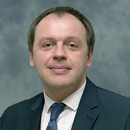Philology in North-Caucasus Federal University
Bachelor’s program
Institute of Humanities,
Department of Russian Language,
Department of National and World Literature

Vyacheslav P. KHODUS,
Head of the Department of Russian Language
Tel.: + 7 8652 33-01-98, ext. 4231, + 7 8652 33-02-03, ext. 4220
E-mail: oiml@inbox.ru
Achievements and awards. The program underwent state accreditation in 2020.
In 2017 the project of the staff of the Department of National and World Literature “The Origins of Genre Fusion in Poetic Manner of National Drama of the XX – XXI centuries” was supported by the RFBR. In 2018 the postgraduate students of this department won the V All-Russian contest of young scholars in the field of art and culture held by the Ministry of Culture of the RF.
Teaching staff of the Department of National and World Literature and the Department of Russian Language consists of 17 highly qualified teachers including 8 Doctors of Sciences and 7 Candidates of Sciences. The academic degree holders ratio is 93%.
The current heads and employees of organizations – directors and leading teachers of general education institutions of Stavropol and the Stavropol Territory are engaged as teachers and supervisors of teaching internships.
Facilities and resources. The most advanced equipment (a multimedia projector, a screen, a PC with internet access) improves the quality of education and is the most important tool for effective management of students' innovative and creative activities.
Research. The institute trains highly qualified academic staff (postgraduate, doctoral studies); activates publication activities of teachers, postgraduate students, graduate students; organizes and participates in international, all-Russian, regional scientific conferences; supervises students’ research; uses research findings in the learning process; cooperates with creative unions.
Education. To improve the quality of education, the teachers use a combination of up-to-date education models such as a traditional model, a rationalistic model, and a student-centered model with application of innovative technologies.
Strategic partners. Major research and education centers: Centred, Research Center for Slavic Studies named after Andre L’Hirondelle, Jean Moulin Lyon 3 University, Sorbonne (France), Poznan University (Poland), the Higher School of Education (Olsztyn, Poland), Janus Pannonius University of Pécs (Hungary), the Schopenhauer Society (Germany), Brusov State University (Armenia), the Crimean Scientific Center, Sofia University (Bulgaria), the Museum of Silver Age Poets in Washington, Boston University (USA).
Competitive advantages. Graduates are highly qualified and in high demand among employers. The facilities and resources are highly efficient. Advanced innovative educational technologies are used. Supplementary education programs are offered. Practical training facilities have been effectively developed.